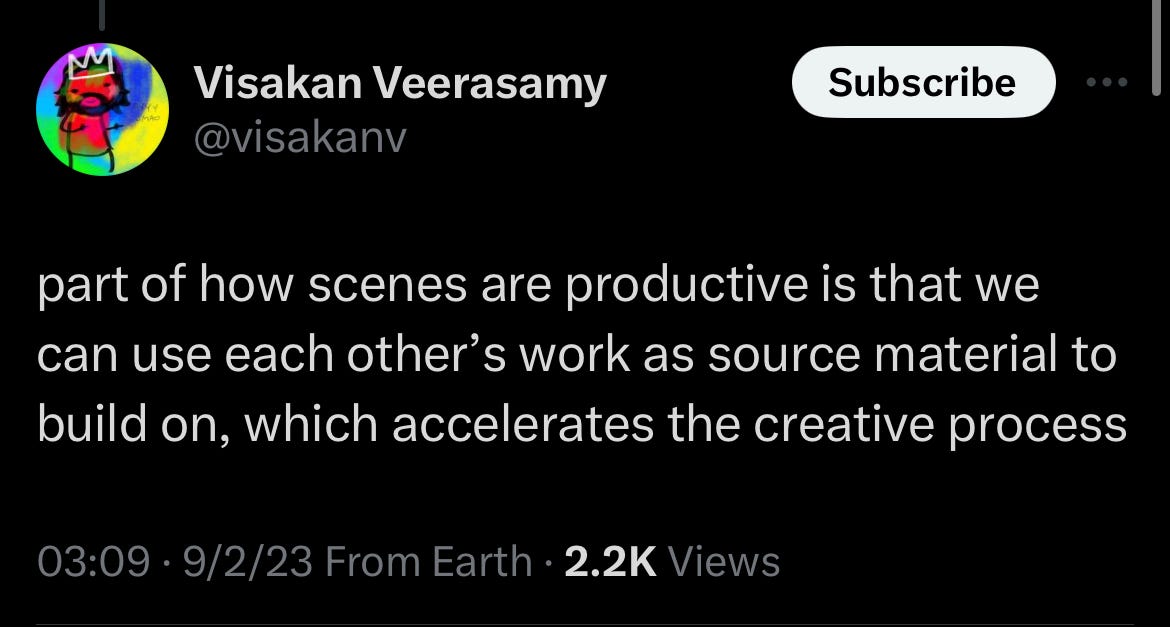“Highly organized research is guaranteed to produce nothing new.”
Dune Part II premiered this weekend. Early reviews have been nothing short of raving.
It marks a good occasion to finally put some thoughts down exploring one of my favorite smaller things from the book itself: The Tansley Effect.
The Tansley Effect appears to be a “fictional concept” Herbert created for the sake of the book, and it hasn’t left my mind since I read it.
It appears in two places in the book, once in an early scene where the Atreides are hosting a dinner party for influential people and nobility early on in their time on Arrakis, and once in the book’s appendix when explicating its ecology further. In both instances it comes from or attached to Kynes, Arrakis’ Chief Planetologist (aka an ecologist). Thankfully, and critically, Herbert was kind enough to give us a general, directional definition for it.
The first, in the scene at the dinner party, while they’re broadly discussing Arrakis’ ecology:
"We've had a long time in which to build up the Tansley Effect - small-unit experiments on an amateur basis from which my science may now draw its working facts." Kynes said.
And the second, in the appendix on its ecology, explaining the origins of Kynes research and station with the Fremen:
“Kynes -- direct, savagely intent Kynes -- knew that highly organized research is guaranteed to produce nothing new. He set up small-unit experiments with regular interchange of data for a swift Tansley effect, let each group find its own path. They must accumulate millions of tiny facts. He organized only isolated and rough run-through tests to put their difficulties into perspective.”
What initially came to mind is, in computer science, you might be able to think about this in terms of the explore vs. exploit function - namely, leaning toward the explore over the exploit. That is to say: trying things. Experimenting. That is how discovery and breakthrough happen. Rather than focused, goal-directed seeking.
It also makes me think of this tweet from @RomeoStevens76 commenting on R&D expenditures at large corporations:
“Real R&D is illegible and can look like goofing off. As the liability monster metastasizes it becomes increasingly unacceptable to do real R&D, though simulcra that are higher legibility, higher status, and therefore almost never hit serious breakthroughs remain.”
These all draw the context for what kind of thing the Tansley Effect is, but they don’t point at it directly. So what is it, directly - other than something brought about by “small-unit experiments with regular interchange of data”? And why is it named “Tansley”?
Arthur Tansley was an English botanist and early pioneer of the field of ecology who is credited with originating the concept of “ecosystem” (though not coining it, he asked someone else to come up with the term for him).
He founded the first professional society for ecologists, was the first president of The British Ecological Society, a founding editor for the Journal of Ecology, and the founder of the New Phytologist which still publishes “Tansley Reviews'' and awards a “Tansley Medal”. He was also a Fellow of the Royal Society and knighted in 1950.
[It’s also worth noting that Tansley had a serious interest in psychology and psychoanalysis of the time. Which included a friendship with Freud, studying under him for a year in Vienna, writing his obituary, and publishing a bestselling book on the ideas of Freud and Jung in 1920.]
In any case, Herbert’s homage appears well-placed.
Outside of his resume accomplishments, the tenor of Tansley’s work can be seen in his emphasis on synthesis and collaboration.
He helped form the British Vegetation Committee - a group aimed at coordinating ongoing studies and standardizing methodology. Later, Tansley and that group organized the International Phytogeographic Excursion, which further strengthened connections with botanists from the U.S., Germany, Switzerland, and Sweden among others.
A U.S. ecologist noted that Tansley’s influence was largest in synthesizing individual studies into a single whole, and the New Phytologist, in its “Tansley reviews”, encourages “personal perspectives, with lively and thought-provoking discussion”, as well as “synthesis and presentation of new ideas”, rather than documentation - in keeping with his philosophy.
Tansley originated the term “ecosystem”, but he also implemented and cultivated it in his work, intentionally or not. The field of ecology itself benefited enormously from the many connections and collaborations between independent ecologists and field researchers that he helped cultivate.
Information-sharing. Publications. Societies. Discussion. Debate. Synthesis. These acted as force multipliers for the many independent approaches and experiments being conducted by disparate actors in a burgeoning field.
This is the Tansley Effect.
It is a distributed, decentralized information and experimentation ecosystem itself. A multitude of fully independent approaches and experiments exploring a common field in a loosely connected way. But importantly, not a highly organized, over-engineered way. They are working independently, but sharing information and riffing on each other.
—-----
Lastly, this brings to mind for me Visa Veerasamy’s (@visakanv) idea of “scenes”, and his tweeting about scenes is part of the reason this was able to crystallize in my mind.
I am not going to restate him at length about what scenes are, though some select tweets are below and I encourage you to go check it out further as you’re interested.
What I will say is that the Tansley Effect, named after an ecologist and coined in the context of a fictional ecology, does not at all only apply to ecology. This may be obvious, and I hope it is by now, but in the interest of stating the obvious: ‘ecosystems’ of disparate actors working independently, sharing information, and riffing on each other in any field are liable to give rise to emergent flourishing.
Toward more scenes, everywhere. And more of the Tansley Effect.








